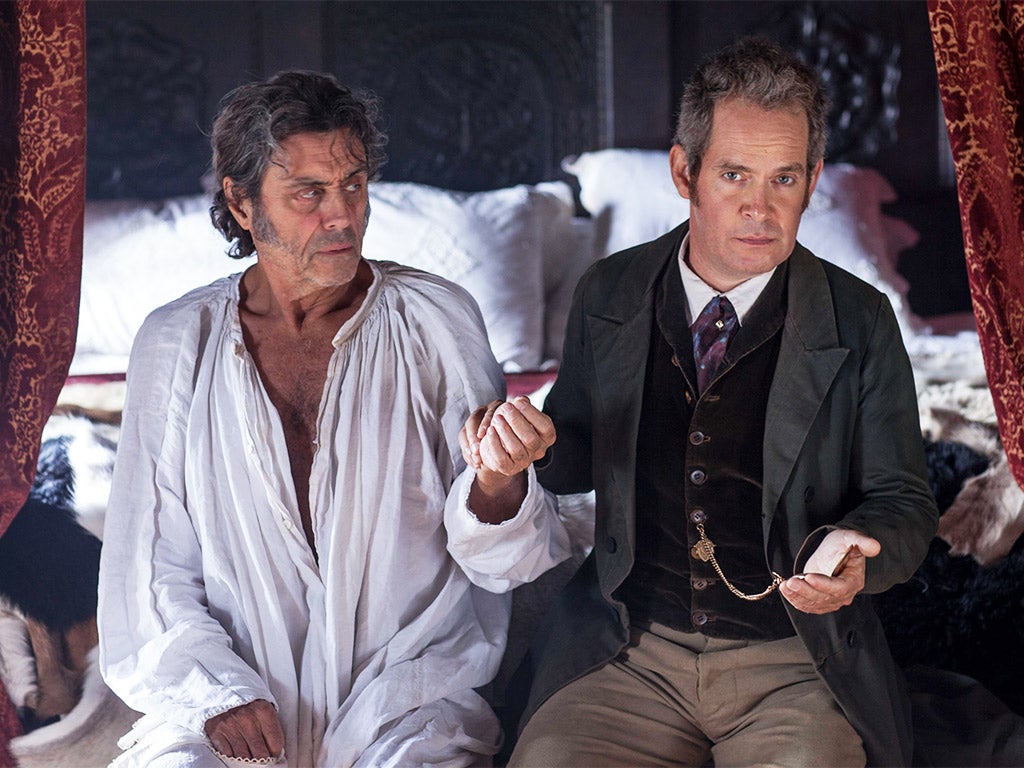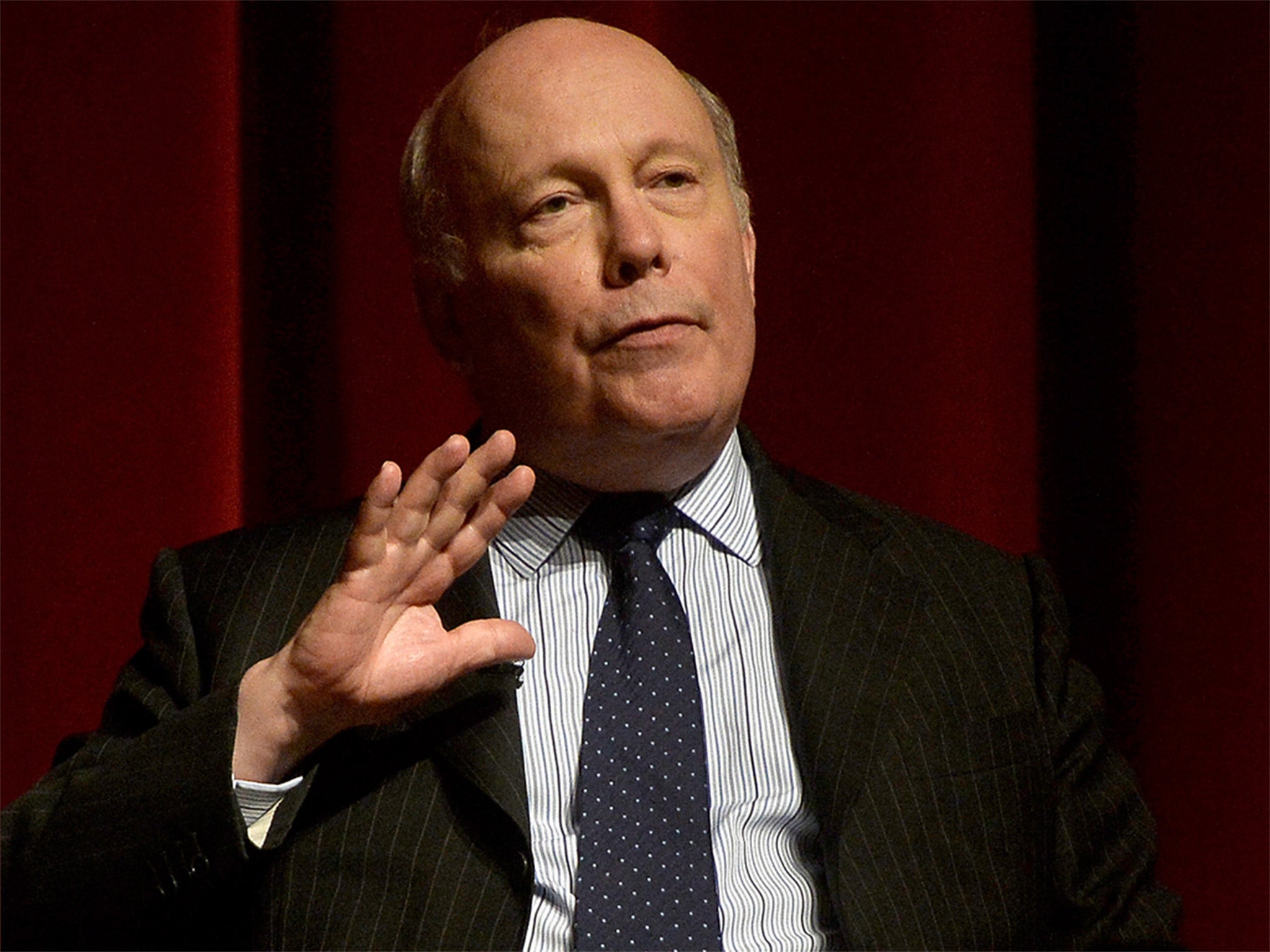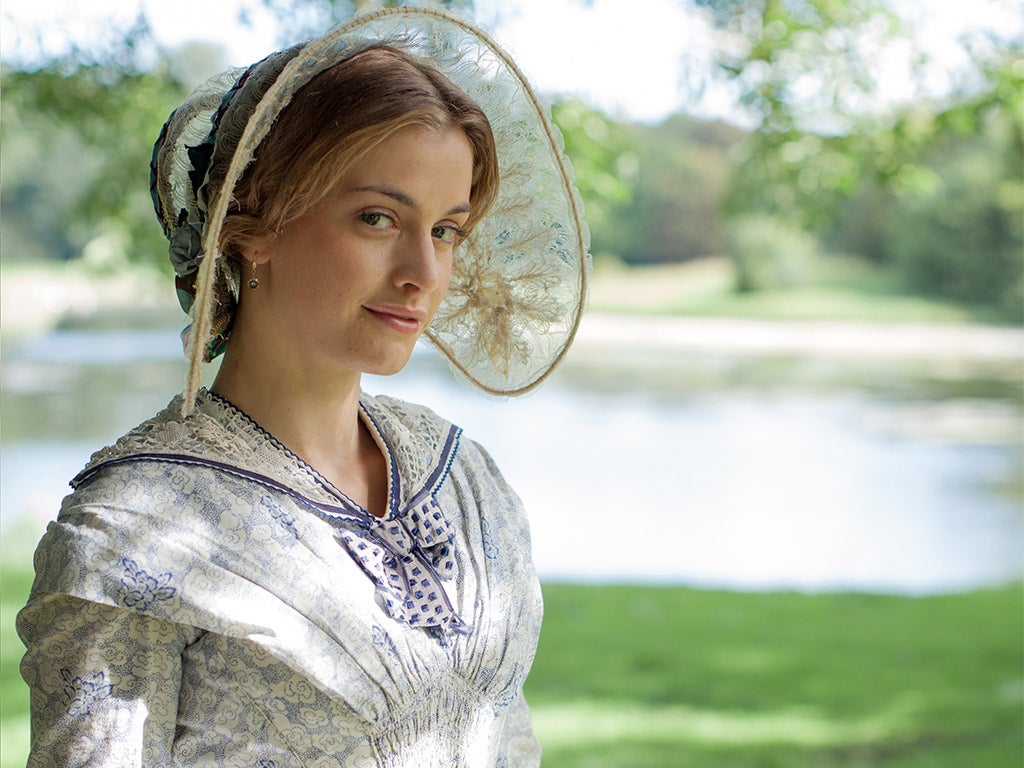Julian Fellowes interview: 'The literary luvvie brigade patronise Anthony Trollope because he's so popular'
Julian Fellowes' first TV drama since Downton Abbey is an adaptation of 'Doctor Thorne', Anthony Trollope's 1858 tale of romantic intrigue. He tells Gerard Gilbert why this 'populist but patronised' author has a particular resonance for him

West Wycombe Park, the National Trust property in Buckinghamshire that was built for the 18th-century libertine Sir Francis Dashwood, founder of the Hellfire Club, is still managing to look spectacularly elegant in the drizzly winter murk. Perhaps there will be little surprise that this Palladian pleasure palace is the setting for the first new drama written by Julian Fellowes following the closure of Downton Abbey.
Doctor Thorne is Fellowes's adaptation for ITV of Anthony Trollope's 1858 novel of the same name, the third in Trollope's Chronicles of Barchester series. It stars Tom Hollander in the title role of a country physician and follows his attempts to secure the romantic and financial fortunes of his illegitimate niece, Mary, who is beloved by the scion of her aristocratic but impoverished neighbours. But this young man's mother (played by Rebecca Front) wants him to marry a rich American heiress, played Alison Brie – Trudy Campbell from Mad Men.
The cast also includes Ian McShane, Phoebe Nicholls and (much to the excitement of certain sections of the media because she used to date Prince Harry) Cressida Bonas. When I catch up with Fellowes later, I ask him why he chose Trollope's story for his first post-Downton television project.
"I wanted to allow television makers to see that they don't have to do Jane Austen and Charles Dickens every time," he says. "And his dialogue is very modern and jumps on to the screen – I mean most of the dialogue in this is him not me.
"That and also his understanding of the importance of money, that in the end, people may claim 30 generations of sceptred knights, but what matters is how much money they've got. And again that's very contemporary."
Notable TV adaptations of Trollope include the BBC's 1974 series The Pallisers, scripted by Simon Raven and starring Anna Massey and Jeremy Irons; The Barchester Chronicles from 1982, with Alan Rickman, Geraldine McEwan and Susan Hampshire; The Way We Live Now (2001); and a 2004 version of He Knew He Was Right, scripted by Andrew Davies (War and Peace, Pride and Prejudice).
"I read in the papers today that Andrew Davies is doing The Pallisers for the BBC, so hopefully now Trollope's ship is under steam again," says Fellowes. "There is an intellectual snobbery about liking Trollope, the sort of literary luvvie brigade always like to patronise him because he's so popular, I think, and that makes him populist in their eyes."
Is this something Fellowes can identify with – after all the success of Downton Abbey was accompanied by a chorus of detractors?
"Someone was writing an article about Laura Carmichael [the actress who plays Lady Edith in Downton Abbey], who's doing The Maids next and they said this must be a big step for her because she's been "tootling her way through six years of Downton". You think, God, here is this woman who's been breaking hearts in every land and that's "tootling her way through it".

Watch Apple TV+ free for 7 day
New subscribers only. £9.99/mo. after free trial. Plan auto-renews until cancelled.
ADVERTISEMENT. If you sign up to this service we will earn commission. This revenue helps to fund journalism across The Independent.

Watch Apple TV+ free for 7 day
New subscribers only. £9.99/mo. after free trial. Plan auto-renews until cancelled.
ADVERTISEMENT. If you sign up to this service we will earn commission. This revenue helps to fund journalism across The Independent.
"So I suppose I do slightly sympathise with Trollope being dismissed, although I wouldn't like to put myself on his level."

Downton Abbey was itself accused of snobbery – probably most famously by the historian Simon Schama. "I don't think it was snobbish to people who watched it," says Fellowes. "I think when you heard of it and it was about an earl and his servants, it sounds snobbish. But the key to the programme I think is that all of the characters within it were given the same weight dramatically. So you were no less involved with the kitchen maid than you were with Edith Crawley, and I think that was actually the key to its popularity.
"We didn't patronise the servants or we didn't make the family horrible and all the servants gallant, we just made them a group of people trying to get through it and I think that's what people connected with. I hasten to add that Mr Schama is fully entitled to his own opinion – a man of whom I am a big fan."
Back inside West Wycombe Park – which has provided a backdrop for countless period dramas, including Downton Abbey itself, to the Keira Knightley film The Duchess, Effie Gray and W.E. – Tom Hollander and Rebecca Front are filming a scene together. For Hollander, the drama is a chance to be reunited with Fellowes, with whom he worked on Robert Altman's 2001 movie Gosford Park (which Fellowes scripted).
"He's obviously been on a huge journey since Gosford Park," says Hollander, "where he was very much subordinate to Robert Altman. But now he's Lord Fellowes of Trumpington or wherever it is... somewhere in Dorset [his title, bestowed in 2011, is actually the Lord Fellowes of West Stafford].
"The first day we shot Doctor Thorne was a Tuesday afternoon at a house called Wrotham, up in Barnet, and we shot Gosford Park there. So the first day he was there and I was there and it was 17 years later, and it was very touching. I am proud to be playing the lead for him in his high period".
"Tom is a revelation in this," says Fellowes in return. "I always thought of him as a fantastic comic actor because that's almost all that I've seen him in – including Gosford Park, in which he was a tragic figure but a funny tragic figure. In Doctor Thorne he has a different quality, his role is to be the kind of decency at the centre of the story... and it's quite challenging because it is very hard to find charismatic niceness. I think now Tom will have the choice a great many more straight roles."
And when it comes to acting, Fellowes knows of what he speaks. Before finding his métier and winning an Oscar for his first screenplay – for Gosford Park, Fellowes was a jobbing character actor for the best part of 25 years. The insecurity of that profession has stayed with him, he says.
"When you've been an actor, the use of 'no' rather goes out of your vocabulary," he says, "because you have so many long days when you just someone to want you for something."

Is there also an element of making hay while the sun shines, especially as, now aged 66, he was such a late bloomer as a writer? "Yes, there is an element of that. If I was 30 I would have years ahead."
What he has said "yes" to is a new original drama for NBC in the United States, a sort of American Downton Abbey set in 1880s New York, called The Gilded Age. As soon as he has finished publicity for Doctor Thorne, he will be knuckling down to write the scripts.
"I'm rather looking forward to The Gilded Age", he says. "It was an extraordinary society and didn't last all that long. It really got going around about 1880 and was over by the end of the 1920s... certainly by the Second World War. You had this curious almost civil war between the East Coast aristocracy, most of whom were descended from the sons of the gentry of England and Holland, and these new families – the Vanderbilts, the Jay Goulds, the Whitneys and so on."
The clash of old and new money – this time in 1840s London – is also the subject of a Fellowes's recently completed Belgravia, a serialised novel in the style of Charles Dickens that is married to new technology: an app. "You tune in and you see the real house, you meet the characters, and it says something like 'Waterloo' and you press Waterloo and you get 'Waterloo was a battle fought on the 18 June 1815...' I think it seems rather a laugh."
He's also been in New York writing the book for School of Rock, a new Broadway musical by Andrew Lloyd Webber adapted from the 2003 Richard Linklater movie. School of Rock aside, I wondered whether Fellowes had a yearning to return to a contemporary (albeit still rarefied) social milieu, such as the ones depicted in his 2004 satirical novel Snobs or his follow-up fiction, Past Imperfect.
"It's difficult to say until I get to the end of Gilded Age, but I have a feeling that at the end of that I will try to do something contemporary. Separate Lies [Fellowes's 2005 screenplay, which he also directed] is probably my own favourite piece of my work, is contemporary, so I imagine I would go back to that. But you know, sufficient unto the day... I've got enough for the time being to keep me out of mischief."
'Doctor Thorne' is on ITV in early March
Join our commenting forum
Join thought-provoking conversations, follow other Independent readers and see their replies
Comments
Bookmark popover
Removed from bookmarks